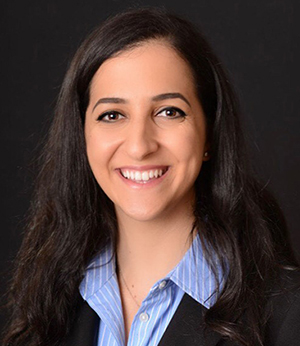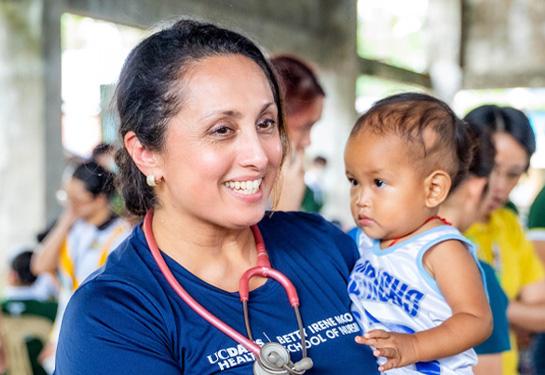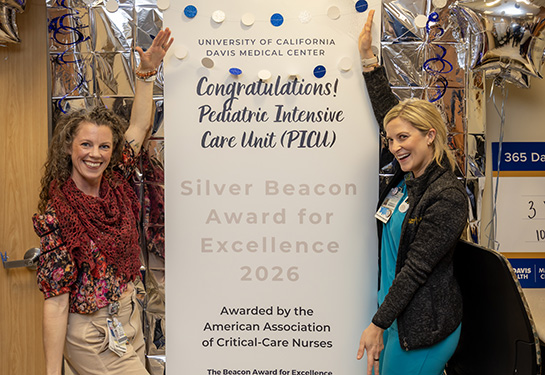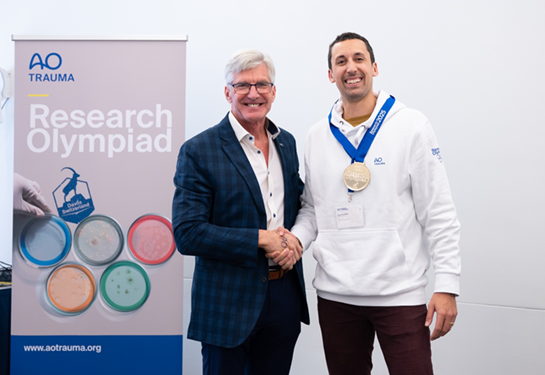Student who seeks to be a doctor in her native South Central Los Angeles gets major award
Personal hardship has inspired Mona Abutouk to reach out to women, refugees and the homeless
A fourth-year medical student who helped start an effort to implement domestic violence screening at a UC Davis student-run clinic has been awarded a major scholarship from the UniHealth Foundation.

Mona Abutouk, who plans to become a primary care physician, said she was grateful and shocked to learn she had been granted the $55,000 award.
“I was almost in disbelief,” she said. “I let out a huge sigh of relief.”
Abutouk was raised in South Central Los Angeles by her mother, a Palestinian immigrant who came to the U.S. in the late 1960s and worked two or three jobs to try to make ends meet. Abutouk has taken out loans to finance her entire medical education and hopes to match into a Southern California residency program and spend her career caring for the underserved.
That’s precisely the type of student UniHealth selects for its scholarships.
The scholarship was established to assist financially strapped students who attended high school in Los Angeles, Orange, Riverside or San Bernardino Counties and express the desire to practice as a primary care doctor or practice in a medically underserved community in any of the four counties.
Abutouk was born in Los Angeles and grew up in a traffic-laden neighborhood crowded with fast food restaurants and small shops. She excelled early on in elementary school and was offered the chance to transfer to a school in a wealthier neighborhood, Pacific Palisades.
The distance meant waking up early to catch the school bus at 5:45 a.m. for the rest of her elementary school years, then middle school and high school, riding into the western edge of Los Angeles County to an affluent residential community where mansions overlook the sea. She took the school bus up until graduation from Palisades Charter High School, a campus where a new BMW or Mercedes in the student parking lot usually signified that someone had just received a 16th birthday gift from their parents.
“It was definitely hard to assimilate,” she said. “I didn’t have the cool clothes or the cool backpack, and I couldn’t always pay for everything like I wanted to, but I think I found my niche: I surrounded myself with people who were bookworms like me.”
Abutouk, who loved science, entered UCLA. Then she had a traumatic experience unrelated to academics.
She ended up in a hospital emergency room to be checked out for injuries she said were caused by a family member. It wasn’t her first visit for that kind of emergency treatment, but this time Abutouk confided in a physician who encouraged her and her mother, who was also a victim of abuse, to seek refuge in a shelter.
Abutouk and her mother moved into a shelter and rebuilt their lives.
“I felt closely connected to women, refugees and the homeless community because of my experiences,” Abutouk said in her application for the scholarship.
As part of transforming her life during her UCLA years, Abutouk spoke out against abuse, volunteered in health fairs attended by immigrant families, helped with a student-run clinic that provided podiatric care for the homeless, and taught nutrition classes to parents of obese children, among other activities.
She’s been just as involved, if not more so, at the UC Davis School of Medicine.
Abutouk was a co-director of the Shifa student-run clinic for Middle Eastern, Muslim and South Asian residents, often speaking Arabic to comfort patients. She was part of a collective effort among medical students in implementing a domestic violence screening questionnaire, which provides helpful resources to women in dangerous relationships.
“That was really meaningful to me because I was able to take my past and use it as a way to help,” Abutouk said. “I think I’m most closely connected to women’s populations, homeless populations and uninsured populations.”
Abutouk has enjoyed meaningful clinical experiences where she is known to put children at ease by playing peek-a-boo with babies in the exam room, tickling toddlers’ tummies and helping teenagers open up and share their most intimate thoughts, according to a mentor.
“On her first day with me, I could already see Mona’s genuine love for children shine through as she appeared to carry a gentle eagerness to learn and interact with patients that was palpable,” said Hai Truong, a senior pediatrician at Kaiser Permanente Elk Grove Medical Offices.
“It is these bonds that she naturally forms with children that will help her create the building blocks towards improving their mental and physical health,” Truong said. “Needless to say, Mona will make an amazing pediatrician.”
Abutouk wants more than anything to return to Los Angeles because it’s her calling. She wants to reunite with her mother, and her sister, who is a law student, and bring good health to patients from underserved communities like the one she grew up in.
She feels she has so much to share.
“When something traumatic happens to you, you either get strong or succumb,” Abutouk said. “My guiding principle is to use my past hardships as a source of strength to enact meaningful future action and change. I wouldn’t change my past. It’s made me the resilient person I am today.”
The UniHealth Foundation is a non-profit philanthropic organization whose mission it is to support and facilitate activities that significantly improve the health and well-being of individuals and communities within its service area.



